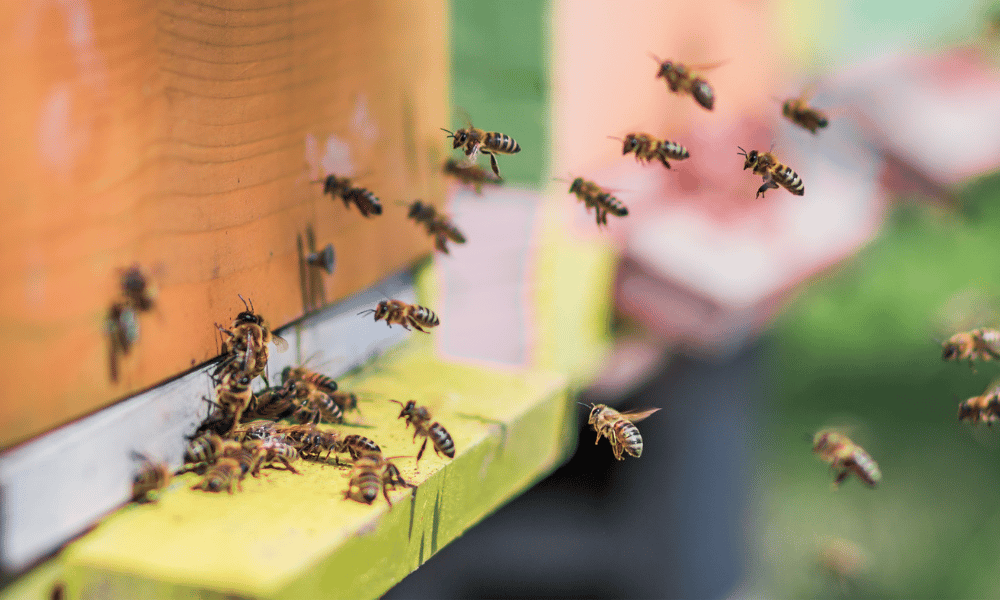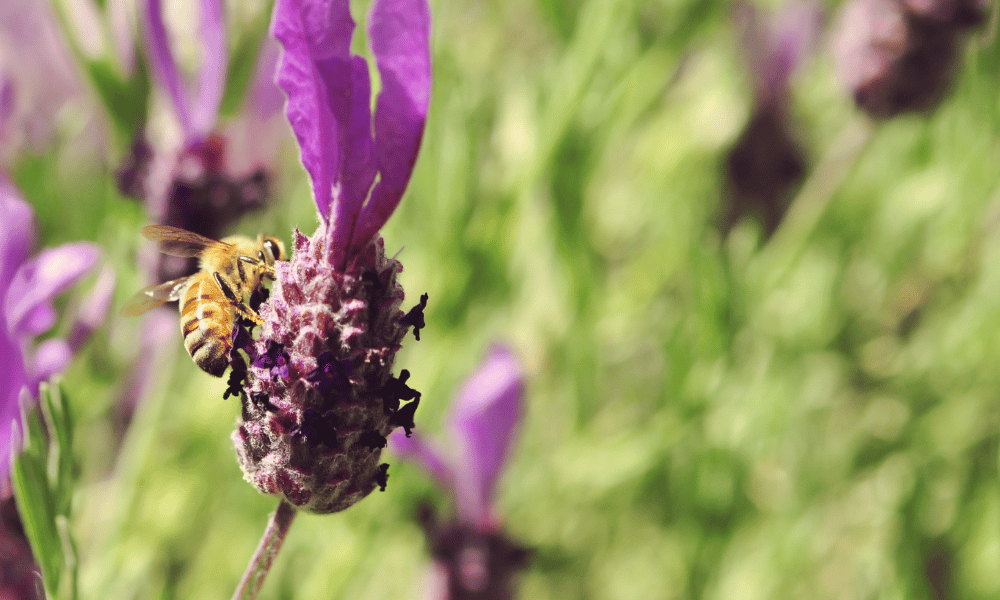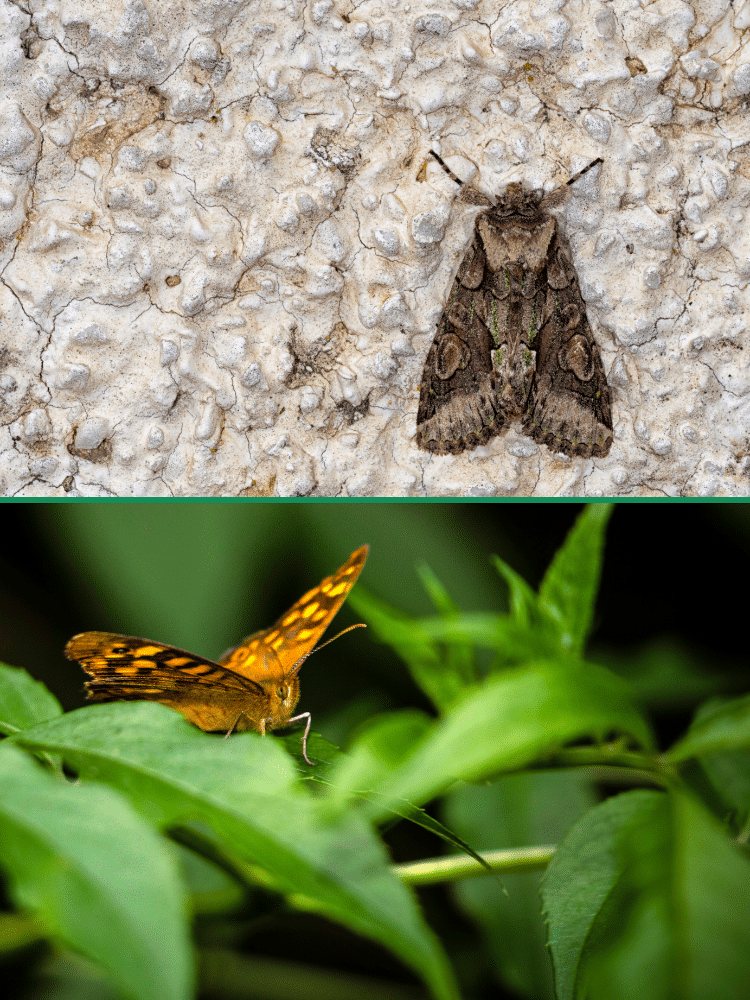Honeybees live in colonies that can grow to around 50,000 bees! With that many insects living and functioning in a small space, communication is vital. But how do bees communicate? Can bees hear?
Yes, bees can hear. Bees communicate in a variety of ways. They release pheromones in crisis situations that attract and warn other bees of danger. They also use buzzing and other vibrations to talk to one another.
Bees have a unique way of hearing the world around them. Instead of hearing in the sense that we are used to, bees listen and hear through vibrations. These vibrations are achieved through different structures along the bee’s body that act as ears.
Do Bees Have Ears?
Even though bees can hear in a sense, they do not have ears. They have other specialized organs that allow them to feel the vibrations of sounds.
The first organ that helps bees do this is called the Johnston’s Organ. This organ is located on the bee’s antennae. In addition to the Johnston’s Organ, bees also have subgenual organs located in their legs.
With the help of these organs, bees can pick up on sound in a few different ways.
If the bee is picking up on an air-borne vibration, they are picking up these signals from the air. Bees will do a special waggle dance that involves buzzing and flapping their wings. During this dance, the bees are communicating through air-borne vibrations.
Substrate vibrations are what the bee would pick up on when the surface they are on vibrates. They feel these vibrations with their legs. Substrate vibrations include raindrops on the beehive, wind on flowers, and even predators approaching nearby.

Do Bees React to Noise?
Yes, bees react and are very sensitive to noise. This is because even though bees do not have ears, they sense the vibrations of the noise in airwaves as it travels through the air.
Intense sound waves can throw a bee off course or even stun them if it is too loud. Fireworks, music concerts, aeroplanes, and even traffic noise can oftentimes be too much for bees to feel comfortable.
Intense noises can also make bees agitated and more likely to attack.
It is not uncommon for these noises to disorient a bee or force them off track. Since the noise and vibrations are interfering with the bees’ ability to get home, they can be forced to wander and get lost.
Want to Attract Bees to Your Garden?
We’ve Put Together a Complete Guide to Attracting Bees to Your Garden Including Our Top 14 Plants You NEED to Have in Your Garden:
Do Bees Like Music?
We know that loud or sudden vibrations can negatively affect bees, but are there any positive ways that we can incorporate sound?
Playing music between 250-500 Hz to attract bees to your garden is a great idea to help increase the number of bees drawn to the flowers.
Music at this decibel is similar to the sound and level that bees have in their hive. Since bees react to vibrations, playing music at this level will help bees feel at home. You can also try this technique to calm agitated bees.
Studies have shown that bees can hear frequencies up to around 500Hz. Oddly enough, they can produce noises from 10Hz through to 1,000Hz.
Should You Talk to Bees?
Throughout history, honey bees have been highly regarded and respected. In Ancient Egypt, bees were considered to be messengers of the gods (you can learn more about this here).
As time moved forward, beekeepers still revered bees to be highly intelligent and important. It was common practice for beekeepers to treat their bees as extended family members.
They would talk to bees respectfully, keep the bees up to date on family events, and even drape black gauze over the hive when an owner died.
Once someone was assigned to take over the hive, they would have to introduce themselves to the hive in a respectful way and ask the bees if it would be okay if they took over.
Today, many beekeepers keep the practice of “telling the bees”. It is to be done in a peaceful and low tone of voice so as not to startle the bees.
Developing a relationship with your hive can increase the amount of honey the bees produce. It is also thought that bees will learn the faces and voices of their human companions and be less likely to sting them.
Unbelievably, recent studies have shown that bees can remember human faces and that different humans do not look alike to them.
Summary
Honeybee colonies are complex and extremely large populations of bees working together to complete a common goal. As with any civilization, communication is of vital importance.
Bees communicate as well as listen through vibrations. The buzzing of a bee that we hear is felt by other bees with help of their two vibration-sensing organs that act as ears.
Because bees can listen through air-borne vibrations, certain behaviours like dancing or buzzing, helps bees send messages to one another. Bees also can pick up vibrations through surfaces thanks to the receptors in their legs.
Loud noises can be startling to bees and some can even stun or paralyze a bee for close to 30 minutes! Fireworks, traffic noise, construction work, and other loud unnatural noises can cause bees to become disoriented and agitated. They can also cause the bees to get lost.
You can calm bees by playing music that is at the same decibel as their hive activity would be. It is also common and much appreciated for beekeepers to talk to their bees in an ancient practice called “telling the bees”.







